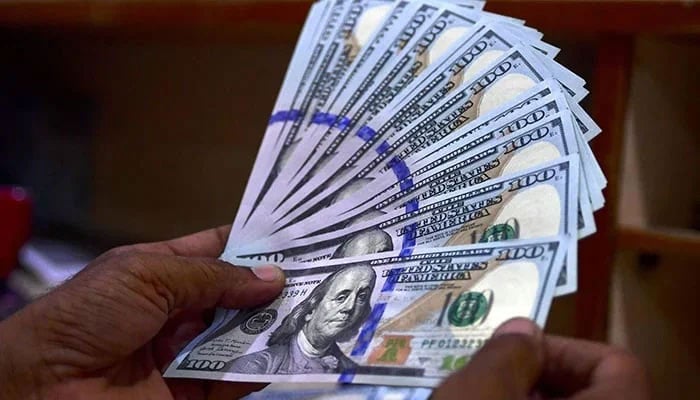Forex reserves up from $2.7bn to $11.7bn in 2 years: SBP
Through debit cards, payment made by commercial banks to Masters and Visa cards stood at $100m
ISLAMABAD: The State Bank of Pakistan (SBP) has purchased $4.5 billion in the first half of the current fiscal year through open market, arguing the foreign exchange reserves went up from $2.7 billion to $11.7 billion in two years without accumulation in external public debt.
However, the Senate Standing Committee on Finance raised serious alarm bells when the Chairman of the Panel Senator Saleem Mandviwalla took up an issue that dollar outflow ranging between $600 million to $1 billion was occurring on annual basis due to repayment to Masters and Visa cards on the usage of debt and credit cards even on the transactions made to draw rupees from ATMs in shape of fees and charges.
However, SBP Governor Jameel Ahmed denied it and stated that such arrangement was essential for ensuring international payment for conducting transactions and PayPak did not provide such facility.
The SBP’s executive director stated that earlier the Masters and Visa Cards were getting $1.4 billion on account of fees and charges but the SBP revised the arrangement and now it ranges $800 million on a per annum basis. Through debit cards, the payment made by commercial banks to Masters and Visa cards stood at $100 million.
The chairman of the Senate panel said that debit card payment for rupees withdrawal through ATMs resulted in payment of $600 million to $1 billion at a time when the country was running from pillar to post to save pennies on the dollar.
Talking to the journalists after attending the Senate Panel meeting, the SBP governor said that the Central bank purchased approximately $4.5 billion from the open market operation. He said that the deposit from UAE was expected soon. The sources said that Pakistan has made a formal request for a rollover of $3 billion from UAE in the shape of $2 billion and $1 billion respectively.
Earlier, in the committee proceedings, the SBP governor said that the foreign exchange reserves went up from $2.7 billion to $11.7 billion in the last two years and these were the most genuine increase in it. He argued that the external public debt stood at $100 billion two years back and currently it stood at the same position but the foreign exchange reserves touched $12 billion but due to repayments it now reduced to $11.7 billion.
Saleem Mandviwalla said that each bank was paying $2.5 million to Masters and Visa cards on a weekly basis at a time when the country was facing a severe balance of payment crisis two years back.
The SBP governor said that the outflow to Masters and Visa Cards stood at $1.4 billion in 2022 after which the arrangements were revised and currently it stood at $800 million on a per annum basis. The chairman of the Senate panel stated that it could not go on and it should be stopped immediately. He also threatened that they would not have any choice but to move a piece of legislation to stop this dollar outflow.
The SBP high ups took the stance that the Pay Pak was the local arrangement which possessed a share of 23 percent and there were 11 million debit cards using Pay Pak while the major chunk being used by Masters and Visa Cards through different ATMs of commercial banks.
The chairman Senate panel also inquired about the payment amount made to banks and exchange companies through Pakistan Remittance Initiatives (PRI). The SBP informed the committee that they paid out Rs86 billion in the last fiscal year as a subsidy for promoting remittances in the country.
-
 Kanye West's Last Measure To Save Bianca Censori Marriage As He Tries To Salvage Image
Kanye West's Last Measure To Save Bianca Censori Marriage As He Tries To Salvage Image -
 Kim Kardashian Finally Takes 'clear Stand' On Meghan Markle, Prince Harry
Kim Kardashian Finally Takes 'clear Stand' On Meghan Markle, Prince Harry -
 Christina Applegate Makes Rare Confession About What Inspires Her To Keep Going In Life
Christina Applegate Makes Rare Confession About What Inspires Her To Keep Going In Life -
 Patrick J. Adams Shares The Moment That Changed His Life
Patrick J. Adams Shares The Moment That Changed His Life -
 Selena Gomez Getting Divorce From Benny Blanco Over His Unhygienic Antics?
Selena Gomez Getting Divorce From Benny Blanco Over His Unhygienic Antics? -
 Meet Arvid Lindblad: Here’s Everything To Know About Youngest F1 Driver And New Face Of British Racing
Meet Arvid Lindblad: Here’s Everything To Know About Youngest F1 Driver And New Face Of British Racing -
 At Least 30 Dead After Heavy Rains Hit Southeastern Brazil, 39 Missing
At Least 30 Dead After Heavy Rains Hit Southeastern Brazil, 39 Missing -
 Courtney Love Recalls How ‘comparison’ Left Marianne Faithfull ‘broken’
Courtney Love Recalls How ‘comparison’ Left Marianne Faithfull ‘broken’ -
 Pedro Pascal Confirms Dating Rumors With Luke Evans' Former Boyfriend Rafael Olarra?
Pedro Pascal Confirms Dating Rumors With Luke Evans' Former Boyfriend Rafael Olarra? -
 Ghost's Tobias Forge Makes Big Announcement After Concluding 'Skeletour World' Tour
Ghost's Tobias Forge Makes Big Announcement After Concluding 'Skeletour World' Tour -
 Katherine Short Became Vocal ‘mental Illness’ Advocate Years Before Death
Katherine Short Became Vocal ‘mental Illness’ Advocate Years Before Death -
 SK Hynix Unveils $15 Billion Semiconductor Facility Investment Plan In South Korea
SK Hynix Unveils $15 Billion Semiconductor Facility Investment Plan In South Korea -
 Buckingham Palace Shares Major Update After Meghan Markle, Harry Arrived In Jordan
Buckingham Palace Shares Major Update After Meghan Markle, Harry Arrived In Jordan -
 Demi Lovato Claims Fans Make Mental Health Struggle Easier
Demi Lovato Claims Fans Make Mental Health Struggle Easier -
 King Hospitalized In Spain, Royal Family Confirms
King Hospitalized In Spain, Royal Family Confirms -
 Japan Launches AI Robot Monk To Offer Spiritual Guidance
Japan Launches AI Robot Monk To Offer Spiritual Guidance




